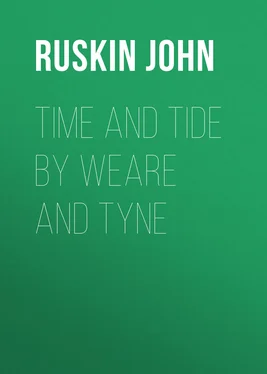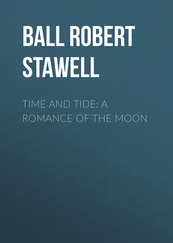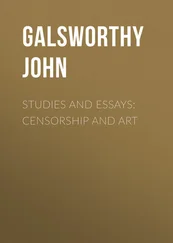John Ruskin - Time and Tide by Weare and Tyne
Здесь есть возможность читать онлайн «John Ruskin - Time and Tide by Weare and Tyne» — ознакомительный отрывок электронной книги совершенно бесплатно, а после прочтения отрывка купить полную версию. В некоторых случаях можно слушать аудио, скачать через торрент в формате fb2 и присутствует краткое содержание. Жанр: foreign_prose, literature_19, foreign_antique, на английском языке. Описание произведения, (предисловие) а так же отзывы посетителей доступны на портале библиотеки ЛибКат.
- Название:Time and Tide by Weare and Tyne
- Автор:
- Жанр:
- Год:неизвестен
- ISBN:нет данных
- Рейтинг книги:4 / 5. Голосов: 1
-
Избранное:Добавить в избранное
- Отзывы:
-
Ваша оценка:
- 80
- 1
- 2
- 3
- 4
- 5
Time and Tide by Weare and Tyne: краткое содержание, описание и аннотация
Предлагаем к чтению аннотацию, описание, краткое содержание или предисловие (зависит от того, что написал сам автор книги «Time and Tide by Weare and Tyne»). Если вы не нашли необходимую информацию о книге — напишите в комментариях, мы постараемся отыскать её.
Time and Tide by Weare and Tyne — читать онлайн ознакомительный отрывок
Ниже представлен текст книги, разбитый по страницам. Система сохранения места последней прочитанной страницы, позволяет с удобством читать онлайн бесплатно книгу «Time and Tide by Weare and Tyne», без необходимости каждый раз заново искать на чём Вы остановились. Поставьте закладку, и сможете в любой момент перейти на страницу, на которой закончили чтение.
Интервал:
Закладка:
It is now some five or six years since I first had occasion to speak to the members of the London Working Men's College on the subject of Reform, and the substance of what I said to them was this: "You are all agape, my friends, for this mighty privilege of having your opinions represented in Parliament. The concession might be desirable,—at all events courteous,—if only it were quite certain you had got any opinions to represent. But have you? Are you agreed on any single thing you systematically want? Less work and more wages, of course; but how much lessening of work do you suppose is possible? Do you think the time will ever come for everybody to have no work and all wages? Or have you yet taken the trouble so much as to think out the nature of the true connection between wages and work, and to determine, even approximately, the real quantity of the one, that can, according to the laws of God and nature, be given for the other; for, rely on it, make what laws you like, that quantity only can you at last get.
10. "Do you know how many mouths can be fed on an acre of land, or how fast those mouths multiply? and have you considered what is to be done finally with unfeedable mouths? 'Send them to be fed elsewhere,' do you say? Have you, then, formed any opinion as to the time at which emigration should begin, or the countries to which it should preferably take place, or the kind of population which should be left at home? Have you planned the permanent state which you would wish England to hold, emigrating over her edges, like a full well, constantly? How full would you have her be of people, first? and of what sort of people? Do you want her to be nothing but a large workshop and forge, so that the name of 'Englishman' shall be synonymous with 'ironmonger,' all over the world? or would you like to keep some of your lords and landed gentry still, and a few green fields and trees?
11. "You know well enough that there is not one of these questions, I do not say which you can answer, but which you have ever thought of answering; and yet you want to have voices in Parliament! Your voices are not worth a rat's squeak, either in Parliament or out of it, till you have some ideas to utter with them; and when you have the thoughts, you will not want to utter them, for you will see that your way to the fulfilling of them does not lie through speech. You think such matters need debating about? By all means debate about them; but debate among yourselves, and with such honest helpers of your thoughts as you can find; if by that way you cannot get at the truth, do you suppose you could get at it sooner in the House of Commons, where the only aim of many of the members would be to refute every word uttered in your favor; and where the settlement of any question whatever depends merely on the perturbations of the balance of conflicting interests?"
12. That was, in main particulars, what I then said to the men of the Working Men's College; and in this recurrent agitation about Reform, that is what I would steadfastly say again. Do you think it is only under the lacquered splendors of Westminster,—you working men of England,—that your affairs can be rationally talked over? You have perfect liberty and power to talk over, and establish for yourselves, whatever laws you please; so long as you do not interfere with other people's liberties or properties. Elect a parliament of your own. Choose the best men among you, the best at least you can find, by whatever system of election you think likeliest to secure such desirable result. Invite trustworthy persons of other classes to join your council; appoint time and place for its stated sittings, and let this parliament, chosen after your own hearts, deliberate upon the possible modes of the regulation of industry, and advisablest schemes for helpful discipline of life; and so lay before you the best laws they can devise, which such of you as were wise might submit to, and teach their children to obey. And if any of the laws thus determined appear to be inconsistent with the present circumstances or customs of trade, do not make a noise about them, nor try to enforce them suddenly on others, nor embroider them on flags, nor call meetings in parks about them, in spite of railings and police; but keep them in your thoughts and sight, as objects of patient purpose and future achievement by peaceful strength.
13. For you need not think that even if you obtained a majority of representatives in the existing parliament, you could immediately compel any system of business, broadly contrary to that now established by custom. If you could pass laws to-morrow, wholly favorable to yourselves, as you might think, because unfavorable to your masters, and to the upper classes of society,—the only result would be that the riches of the country would at once leave it, and you would perish in riot and famine. Be assured that no great change for the better can ever be easily accomplished, or quickly; nor by impulsive, ill-regulated effort, nor by bad men; nor even by good men, without much suffering. The suffering must, indeed, come, one way or another, in all greatly critical periods; the only question, for us, is whether we will reach our ends (if we ever reach them) through a chain of involuntary miseries, many of them useless, and all ignoble; or whether we will know the worst at once, and deal with it by the wisely sharp methods of Godsped courage.
14. This, I repeat to you, it is wholly in your own power to do, but it is in your power on one condition only, that of steadfast truth to yourselves, and to all men. If there is not, in the sum of it, honesty enough among you to teach you to frame, and strengthen you to obey, just laws of trade, there is no hope left for you. No political constitution can ennoble knaves; no privileges can assist them; no possessions enrich them. Their gains are occult curses; comfortless loss their truest blessing; failure and pain Nature's only mercy to them. Look to it, therefore, first that you get some wholesome honesty for the foundation of all things. Without the resolution in your hearts to do good work, so long as your right hands have motion in them; and to do it whether the issue be that you die or live, no life worthy the name will ever be possible to you, while, in once forming the resolution that your work is to be well done, life is really won, here and for ever. And to make your children capable of such resolution, is the beginning of all true education, of which I have more to say in a future letter.
LETTER IV.
THE EXPENSES FOR ART AND FOR WAR
15. In the 'Pall Mall Gazette' of yesterday, second column of second page, you will find, close to each other, two sentences which bear closely on matters in hand. The first of these is the statement, that in the debate on the grant for the Blacas collection, "Mr. Bernal Osborne got an assenting cheer, when he said that 'whenever science and art were mentioned it was a sign to look after the national pockets.'" I want you to notice this fact, i. e. , (the debate in question being on a total grant of 164,000 l. , of which 48,000 l. only were truly for art's sake, and the rest for shop's sake,) in illustration of a passage in my 'Sesame and Lilies' (pp. 69, 70 of the small edition, and pp. 46, 47 of Vol. I. of the Revised Series of the Entire Works), [I] Конец ознакомительного фрагмента. Текст предоставлен ООО «ЛитРес». Прочитайте эту книгу целиком, купив полную легальную версию на ЛитРес. Безопасно оплатить книгу можно банковской картой Visa, MasterCard, Maestro, со счета мобильного телефона, с платежного терминала, в салоне МТС или Связной, через PayPal, WebMoney, Яндекс.Деньги, QIWI Кошелек, бонусными картами или другим удобным Вам способом.
to which I shall have again to refer you, with some further comments, in the sequel of these letters. The second passage is to the effect that "The Trades' Union Bill was read a second time, after a claim from Mr. Hadfield, Mr. Osborne, and Mr. Samuelson, to admit working men into the commission; to which Mr. Watkin answered 'that the working men's friend was too conspicuous in the body;' and Mr. Roebuck, 'that when a butcher was tried for murder it was not necessary to have butchers on the jury.'"
Интервал:
Закладка:
Похожие книги на «Time and Tide by Weare and Tyne»
Представляем Вашему вниманию похожие книги на «Time and Tide by Weare and Tyne» списком для выбора. Мы отобрали схожую по названию и смыслу литературу в надежде предоставить читателям больше вариантов отыскать новые, интересные, ещё непрочитанные произведения.
Обсуждение, отзывы о книге «Time and Tide by Weare and Tyne» и просто собственные мнения читателей. Оставьте ваши комментарии, напишите, что Вы думаете о произведении, его смысле или главных героях. Укажите что конкретно понравилось, а что нет, и почему Вы так считаете.












